MercoPress. South Atlantic News Agency
Economy
-
Wednesday, April 23rd 2014 - 07:53 UTC
Argentine economy expands 1.3% in February over a year ago, says government
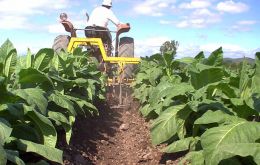
Argentina's economy expanded 1.3% in February compared with the same month a year ago, the government said on Tuesday, a result that outpaced market expectations. The government's stats office Indec also revised January economic activity to positive 1.4% from a previously reported expansion of 1.2%.
-
Wednesday, April 23rd 2014 - 05:37 UTC
Brazil anticipates lower soy exports because of a weaker Chinese demand
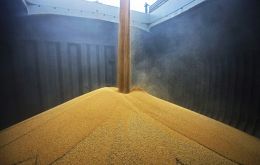
Brazilian soy crushing association Abiove said on Tuesday the nation would export 43 million tons of soybeans from this season's nearly harvested crop, down from its forecast of 44 million tons a month earlier due to weaker Chinese demand.
-
Tuesday, April 22nd 2014 - 07:17 UTC
Mercosur agrees on joint trade proposal to exchange with Europe, announces Mujica
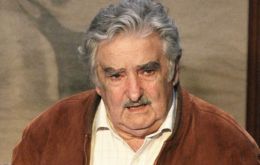
“It took time and effort, but believe it or not” in less than two months time, Argentina, Brazil, Paraguay and Uruguay will be presenting their joint tariff reduction proposal to Europe for discussions on an ambitious Mercosur/EU cooperation and trade agreement that has been on the table since 1999, said President Jose Mujica.
-
Tuesday, April 22nd 2014 - 07:12 UTC
EU anti dumping measures force Argentina to eliminate taxes on bio-diesel
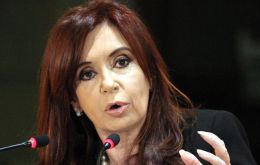
Argentine President Cristina Fernandez on Monday asked Congress to eliminate some of the taxes paid by biodiesel manufacturers in a bid to support an industry hard hit by European Union anti-dumping measures, which was the country's main export market.
-
Tuesday, April 22nd 2014 - 07:01 UTC
Majority of Argentines (61%) dissatisfied with their financial situation
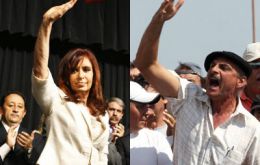
Over 60% of Argentines are not satisfied with their current financial situation and believe the jobs market has little to offer according to the latest public opinion poll referred to the month of March, from Poliarquía Consultores and published in the Buenos Aires daily El Cronista.
-
Tuesday, April 22nd 2014 - 06:45 UTC
US Supreme Court inclined to limit disclosure of Argentine non-US assets

US Supreme Court justices seemed to indicate on Monday that creditors should be able to seek limited information about Argentina's non-US assets in a case stemming from long-running litigation over Argentina's obligations to hedge bond investors. The US administration of President Barack Obama sided with Argentina based on the foreign sovereignty immunity act.
-
Tuesday, April 22nd 2014 - 06:26 UTC
Brazil and Argentina clash over auto-export restrictions; top level mission heads for Buenos Aires

A high level Brazilian government delegation is scheduled to arrive in Buenos Aires on Tuesday to discuss the 'urgent' re-opening of the Argentine market for Brazilian auto exports that have dropped 32% since the beginning of the year because of unilateral decisions from the administration of president Cristina Fernandez.
-
Monday, April 21st 2014 - 07:25 UTC
China's main soy-bean importers in concerted action to bring prices down
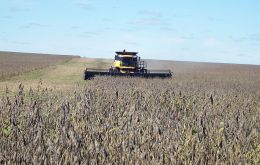
Chinese buyers may default on a further 1.2 million tons of soybeans worth about 900 million dollars being shipped from the United States and South America, to avoid incurring huge losses in a depressed local market, the country’s top soy buyer said.
-
Monday, April 21st 2014 - 07:06 UTC
Argentine bonds' case reaches US Supreme Court; support from Obama administration
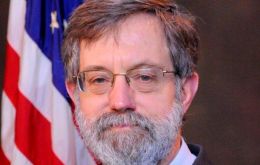
The US government will stand before the Supreme Court on Monday in support of Argentina's position in its ongoing legal fight with bond investors over a ruling which forces banks in New York, with which Argentina does business, to disclose information about the country's non US assets, as investors seek repayment.
-
Monday, April 21st 2014 - 06:24 UTC
Argentina and Paraguay have Mercosur delayed summit in their bilateral agenda
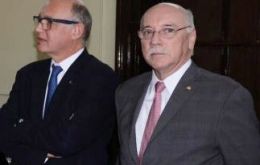
Argentina's Hector Timerman and Paraguay's Eladio Loizaga will be meeting Monday in Asunción to address among other issues the three times delayed Mercosur summit, which should take place in Venezuela, and must be decided before next June when the group's six-month chair again rotates.
